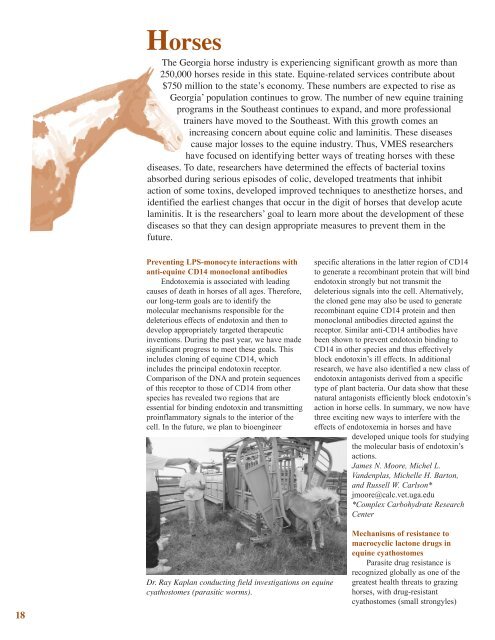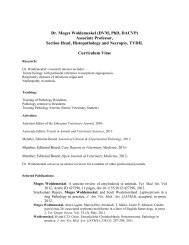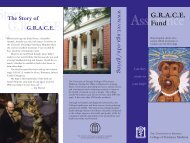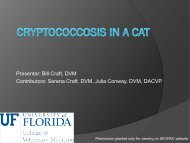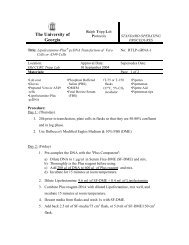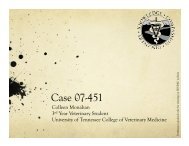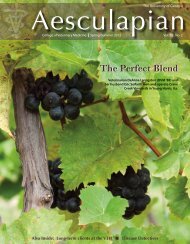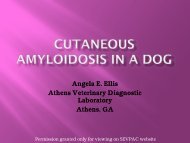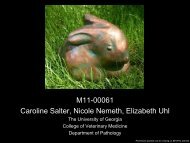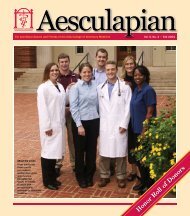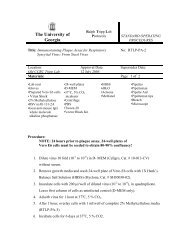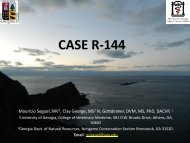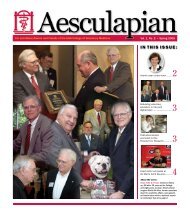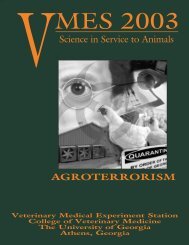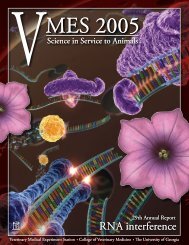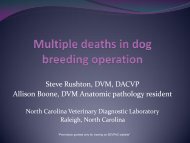Emerging Diseases - University of Georgia College of Veterinary ...
Emerging Diseases - University of Georgia College of Veterinary ...
Emerging Diseases - University of Georgia College of Veterinary ...
Create successful ePaper yourself
Turn your PDF publications into a flip-book with our unique Google optimized e-Paper software.
HorsesThe <strong>Georgia</strong> horse industry is experiencing significant growth as more than250,000 horses reside in this state. Equine-related services contribute about$750 million to the state’s economy. These numbers are expected to rise as<strong>Georgia</strong>’ population continues to grow. The number <strong>of</strong> new equine trainingprograms in the Southeast continues to expand, and more pr<strong>of</strong>essionaltrainers have moved to the Southeast. With this growth comes anincreasing concern about equine colic and laminitis. These diseasescause major losses to the equine industry. Thus, VMES researchershave focused on identifying better ways <strong>of</strong> treating horses with thesediseases. To date, researchers have determined the effects <strong>of</strong> bacterial toxinsabsorbed during serious episodes <strong>of</strong> colic, developed treatments that inhibitaction <strong>of</strong> some toxins, developed improved techniques to anesthetize horses, andidentified the earliest changes that occur in the digit <strong>of</strong> horses that develop acutelaminitis. It is the researchers’ goal to learn more about the development <strong>of</strong> thesediseases so that they can design appropriate measures to prevent them in thefuture.Preventing LPS-monocyte interactions withanti-equine CD14 monoclonal antibodiesEndotoxemia is associated with leadingcauses <strong>of</strong> death in horses <strong>of</strong> all ages. Therefore,our long-term goals are to identify themolecular mechanisms responsible for thedeleterious effects <strong>of</strong> endotoxin and then todevelop appropriately targeted therapeuticinventions. During the past year, we have madesignificant progress to meet these goals. Thisincludes cloning <strong>of</strong> equine CD14, whichincludes the principal endotoxin receptor.Comparison <strong>of</strong> the DNA and protein sequences<strong>of</strong> this receptor to those <strong>of</strong> CD14 from otherspecies has revealed two regions that areessential for binding endotoxin and transmittingproinflammatory signals to the interior <strong>of</strong> thecell. In the future, we plan to bioengineerspecific alterations in the latter region <strong>of</strong> CD14to generate a recombinant protein that will bindendotoxin strongly but not transmit thedeleterious signals into the cell. Alternatively,the cloned gene may also be used to generaterecombinant equine CD14 protein and thenmonoclonal antibodies directed against thereceptor. Similar anti-CD14 antibodies havebeen shown to prevent endotoxin binding toCD14 in other species and thus effectivelyblock endotoxin’s ill effects. In additionalresearch, we have also identified a new class <strong>of</strong>endotoxin antagonists derived from a specifictype <strong>of</strong> plant bacteria. Our data show that thesenatural antagonists efficiently block endotoxin’saction in horse cells. In summary, we now havethree exciting new ways to interfere with theeffects <strong>of</strong> endotoxemia in horses and havedeveloped unique tools for studyingthe molecular basis <strong>of</strong> endotoxin’sactions.James N. Moore, Michel L.Vandenplas, Michelle H. Barton,and Russell W. Carlson*jmoore@calc.vet.uga.edu*Complex Carbohydrate ResearchCenter18Dr. Ray Kaplan conducting field investigations on equinecyathostomes (parasitic worms).Mechanisms <strong>of</strong> resistance tomacrocyclic lactone drugs inequine cyathostomesParasite drug resistance isrecognized globally as one <strong>of</strong> thegreatest health threats to grazinghorses, with drug-resistantcyathostomes (small strongyles)


